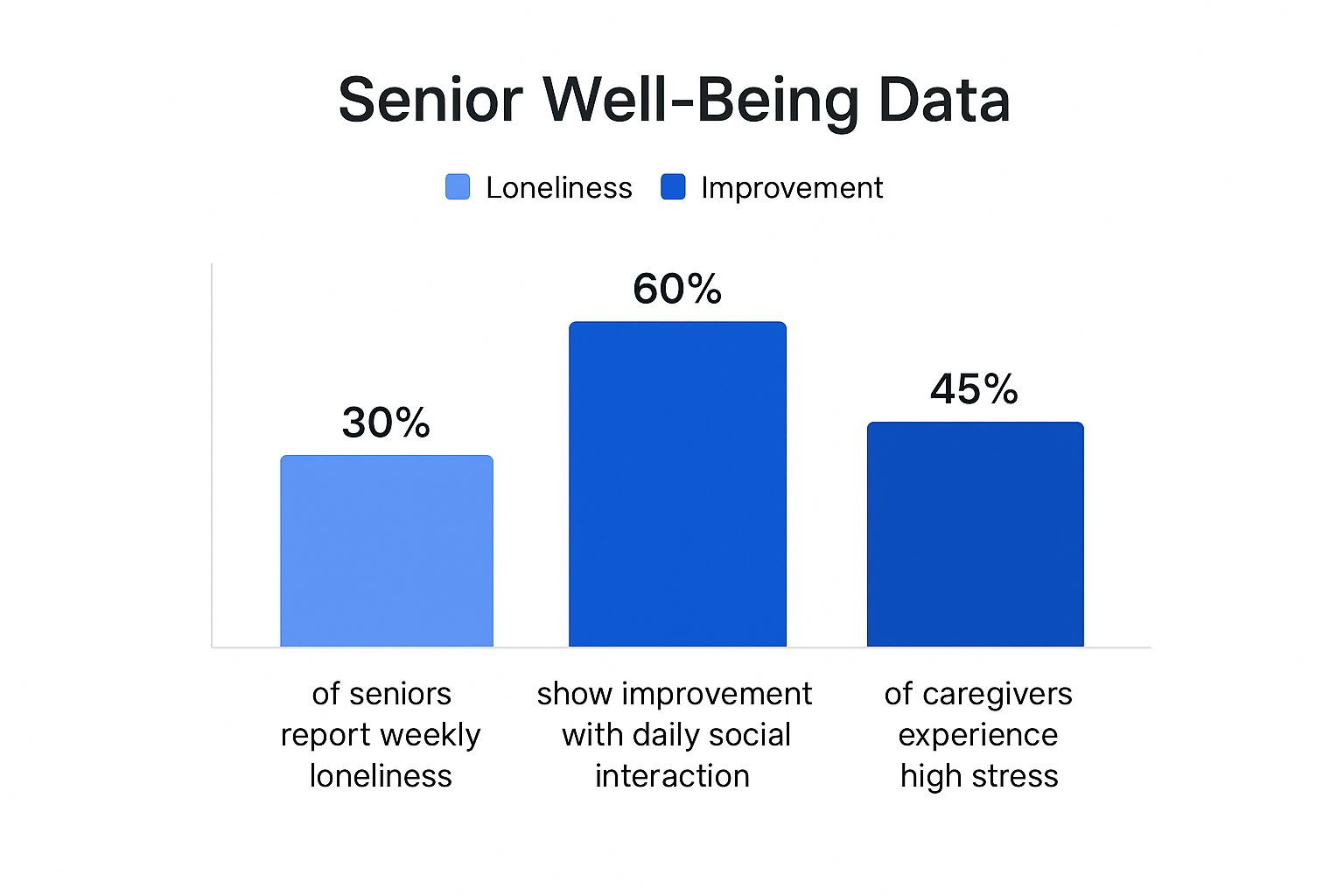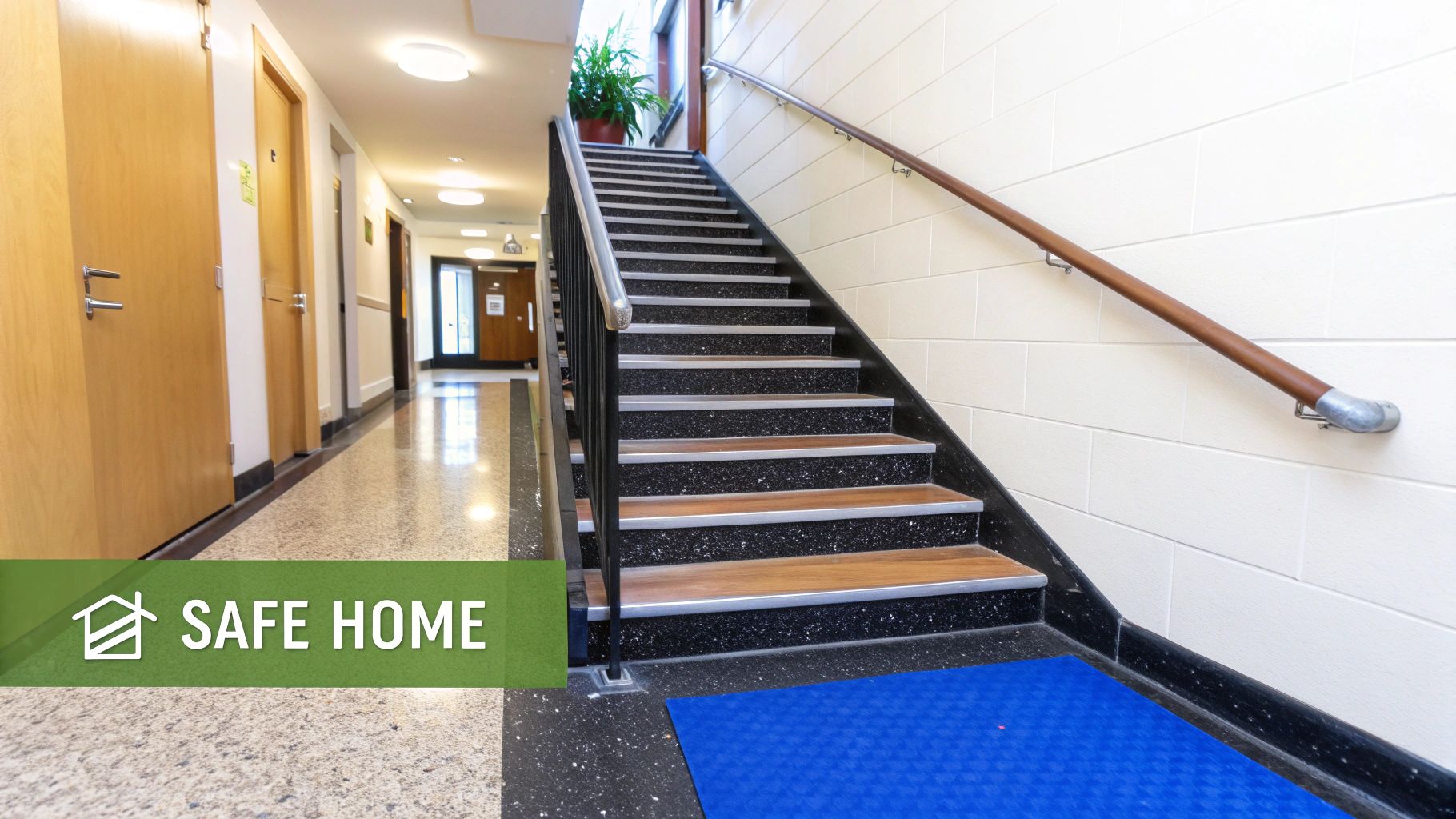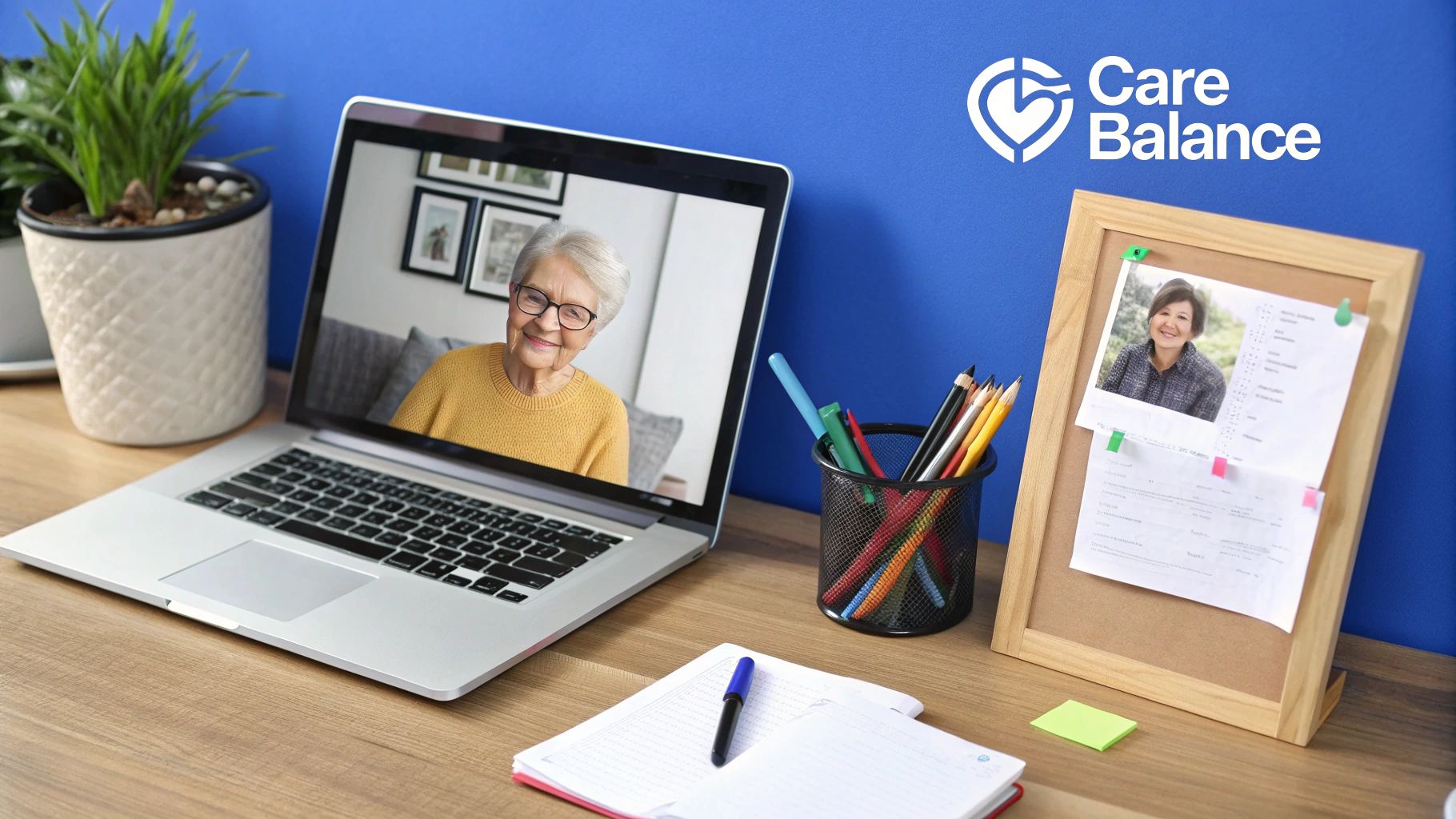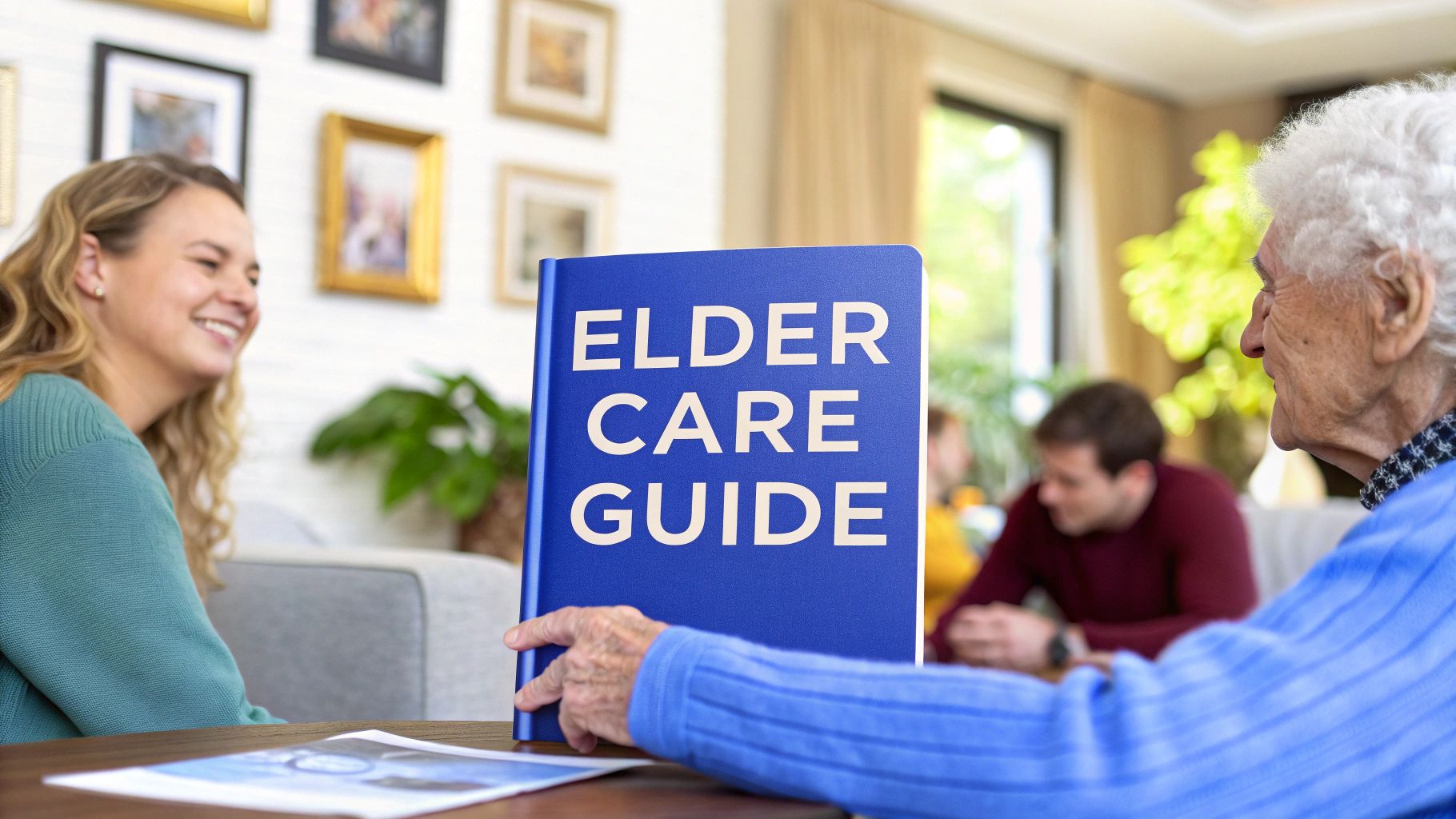Bringing up the idea of future care with your parents can feel like walking on eggshells. It's easily one of the toughest conversations you'll have, demanding a ton of respect, empathy, and really clear communication. But getting it right can transform a difficult talk into a collaborative plan for their future.
The trick is to frame it as a way to ensure they continue to live safely and with dignity, not as a loss of independence.
How to Start the Conversation About Care

So many of us put this conversation off because we're scared. We worry about upsetting our parents, making them feel like we're trying to strip away their autonomy, or even starting a family argument.
But waiting for a health crisis to force your hand is a thousand times more stressful for everyone involved. A proactive, gentle approach builds a foundation of trust that you'll be grateful for later.
Think of this as a series of small, casual chats, not one big, high-stakes meeting. This gives everyone time to process their thoughts and emotions without feeling cornered or completely overwhelmed.
Finding the Right Time and Place
Timing is everything. A holiday dinner or right after a stressful doctor's appointment? Bad idea. You're looking for a quiet, relaxed setting where no one's going to be interrupted.
Maybe you bring it up during a quiet afternoon drive, while you’re working in the garden together, or just over a simple cup of coffee. The environment should feel safe and neutral. The whole point is to make your parents feel heard, not ambushed.
A good way to ease into it is by mentioning a friend's situation or an article you read. It makes the topic feel less direct and personal at first.
Using Collaborative Language
The words you choose matter. A lot. They set the tone for this entire journey. Stay away from anything that sounds accusatory or panicked. Instead, frame the conversation around teamwork and what you all want to achieve together. Make it clear you're on their side.
Here are a few conversation starters that have worked for others:
- "Mom, I was thinking about the future and just wanted to make sure we're all on the same page. What are your thoughts on where you'd like to be in the next few years?"
- "Dad, I want to make sure we always respect your wishes. Could we talk about putting a plan in place so you're always in control of your healthcare decisions?"
- "I know how much you love this house, and I want to help you stay here as long as possible. What could we do now to make that a reality down the road?"
This kind of language positions you as a supportive partner, not someone trying to take over. It’s a crucial part of navigating this with respect.
Key Takeaway: The conversation about care is a process, not a single event. Frame it as a team effort to honor your parents' independence and wishes. Use multiple, low-pressure talks to build trust and create a plan together.
Focusing on Empowerment, Not Limitation
Often, any resistance you encounter comes from a fear of losing control. It's completely understandable. That's why it's so important to present care options as tools to enhance their independence, not take it away.
Talk about how simple modifications to the home or a little extra help each week can allow them to live more safely and comfortably where they are. You can find helpful resources to guide your planning and learn more about caregiving options to make sure you're well-informed.
When you focus on their quality of life and pull them into every decision, you turn a dreaded talk into an empowering step toward a secure and happy future.
Assessing What Your Parents Truly Need
After starting those first, vital conversations, the next step is getting an honest, clear picture of what your parents actually need. This isn't about looking for flaws or pointing out limitations; it's about compassionate observation. The real goal is to gather the right information so you can offer support that’s genuinely helpful, not just what you think they need.
Think of this assessment as a quiet, ongoing process. It’s about paying close attention during visits and phone calls and noticing the small changes that might signal a growing challenge. It's about seeing the whole picture of their daily life.
Observing Daily Living Activities
Start by focusing on the fundamentals—the everyday tasks we all take for granted. These are often the first areas where aging adults begin to struggle, and subtle shifts can reveal a lot about their overall well-being. Look for changes in their routine or home environment that might point to a need for more support.
You can organize your observations by looking at a few key areas:
- Mobility and Physical Health: Do they seem unsteady when they walk? Have they had a fall recently, even if they brushed it off as nothing? Notice if they’ve started avoiding the stairs, holding onto furniture for balance, or mentioning new aches and pains more often.
- Household Management: Is the house tidier or messier than you remember? Take a peek in the fridge—is it stocked with fresh food, or are there a lot of expired items? A stack of unopened mail or unpaid bills can also be a sign that daily chores are becoming overwhelming.
- Personal Care and Hygiene: Pay attention to their appearance. Are they bathing regularly and wearing clean clothes? Sometimes, a decline in personal hygiene can point to depression, memory issues, or physical difficulty with tasks like showering.
Evaluating Health and Medical Needs
Managing health often gets more complicated with age, and this is a critical area where your support can make a huge difference. Taking an objective look at their medical situation is essential.
Involving their primary care doctor is a fantastic way to get an unbiased, professional opinion. With your parent's permission, you could offer to join them for an appointment to discuss their overall health. This shows you're on their team.
Here are a few specific medical areas to pay attention to:
- Medication Management: Are they taking their pills correctly? A full pill organizer at the end of the week or prescriptions that haven't been refilled are big red flags. Forgetting medication or taking the wrong dose can have serious consequences.
- Memory and Cognition: Do they forget appointments, repeat the same stories frequently, or seem confused during conversations? While some memory slips are normal, significant changes really need a professional evaluation.
- Diet and Nutrition: Are they eating regular, balanced meals? Unexplained weight loss or a sudden lack of interest in cooking could signal underlying problems. Proper nutrition is the fuel that keeps them going.
This infographic helps visualize some of the key challenges faced by seniors and their caregivers, highlighting just how important both social and practical support really are.

The data makes it clear: while loneliness is a major issue, it’s often tied directly to caregiver stress, which underscores the need for a balanced, supportive approach to care.
Understanding Emotional and Social Well-Being
Your parents' emotional health is just as vital as their physical health. Isolation is a huge risk for seniors and can lead to depression and a faster decline in cognitive function. Your assessment has to include how they are feeling and staying connected with the world.
Are they still participating in hobbies or seeing friends? Pulling back from social activities they once loved is a warning sign. Loneliness can be a silent problem, so asking direct but gentle questions like, "How have you been feeling lately?" can open the door to a much-needed conversation.
Key Insight: A comprehensive needs assessment isn't a one-time checklist. It’s an ongoing process of observation and conversation that helps you adapt your support as your parents' needs evolve over time.
This is a growing global challenge, especially with the population aged 80 and above expanding so rapidly. Research shows that around 60% of older adults require some type of home visit service, and more than a third need daily care or psychological counseling. Unfortunately, community services often meet only about 20% of this demand, leaving families to fill a significant gap. You can read the full research on elderly care demands to grasp the true scale of this issue.
To help you get started with a structured approach, we’ve put together a simple checklist. It's designed to walk you through the key areas to consider, ensuring you don't miss anything important.
Care Needs Assessment Checklist
| Area of Assessment | Key Questions to Consider | Observation Notes & Action Items |
|---|---|---|
| Personal Care | Are they bathing regularly? Is their hair combed? Are they wearing clean clothes? Can they manage toileting on their own? | |
| Nutrition & Meals | Is there enough healthy food in the house? Are they eating regular meals? Can they cook for themselves? Any recent weight changes? | |
| Household Tasks | Is the home clean and safe? Are bills being paid? Can they manage laundry, dishes, and grocery shopping? | |
| Health & Medical | Are they taking medications correctly? Do they remember appointments? Have there been any recent falls or injuries? | |
| Mobility | Can they get up from a chair easily? Do they seem steady on their feet? Can they navigate stairs safely? | |
| Cognition & Memory | Do they seem confused? Are they repeating stories or questions? Do they get lost or misplace important items frequently? | |
| Social & Emotional | Do they seem lonely or withdrawn? Are they still engaging in hobbies or seeing friends? Have you noticed changes in their mood? |
This checklist is a starting point. Use it to guide your observations and conversations, and remember that the goal is to build a foundation of understanding.
By patiently and thoroughly assessing their needs, you create a solid foundation for a truly effective care plan. For a more detailed guide, you might find our resource on using a care needs assessment checklist helpful. It allows you to tailor your help precisely where it's needed most, honoring their dignity while supporting their independence.
Building a Realistic and Flexible Care Plan

Once you have a clearer picture of what your parents need, it's time to turn that understanding into a concrete plan. But here's the thing: the best care plans aren't rigid documents set in stone. They're living, breathing guides designed to adapt as life happens.
Putting one together is a team effort, balancing the practical stuff with your parents' own wishes and well-being. The real goal isn't just to check off tasks on a schedule; it's to create a support system that actually works for everyone and can last. This plan will be your roadmap for taking care of old age parents, making sure everyone involved feels secure and heard.
Comparing Different Care Options
One of the first big decisions you'll face is where and how care will be provided. Every option has its own pros and cons, and what’s right really boils down to your parent’s health, their personality, and the family's financial situation. It’s so important to look past the brochures and think about what the day-to-day reality of each scenario would look like.
- In-Home Care: For many, staying in a familiar environment is a huge comfort. You can hire professional caregivers for just a few hours a day or for round-the-clock support. This is fantastic for maintaining independence, but it does mean you'll be managing schedules and making sure the home is safe and accessible.
- Assisted Living Communities: These places offer a great mix of independence and support. Residents typically have their own apartments but get access to shared meals, social events, and on-site medical staff. It can be a powerful way to combat the loneliness that often creeps in with old age.
- Nursing Homes (Skilled Nursing Facilities): This is the most intensive level of care, best suited for parents with serious medical needs who require 24/7 supervision and skilled nursing services. While it provides the highest degree of medical support, it also means the biggest loss of personal independence.
Making the right choice starts with honest conversations. You need to talk about what your parent truly wants and what the family can realistically manage, both financially and emotionally.
Dividing Responsibilities with Siblings
When there are siblings in the picture, figuring out who does what is one of the most critical—and potentially tricky—parts of building the care plan. It's easy for resentment to build if one person feels like they're carrying the entire load. Clear communication and a fair division of tasks from the get-go are essential.
The key is to play to everyone's strengths. Maybe the sibling who lives nearby can be the point person for doctor’s appointments and grocery runs. Another sibling who lives farther away but is a whiz with spreadsheets can take over paying bills and handling insurance claims.
A shared digital calendar or even a quick weekly family call can keep everyone in the loop. This simple step prevents things from falling through the cracks and avoids the emotional strain that comes from unspoken expectations.
Key Takeaway: A fair division of labor isn't about making sure everything is split 50/50. It's about ensuring every sibling contributes in a meaningful way that fits their skills and capacity. This fosters a sense of teamwork instead of resentment.
Creating a Plan That Can Evolve
Your parents' needs aren't going to stay the same. A fall could suddenly create new mobility challenges, or a new diagnosis might require a completely different approach to their medical care. Your plan has to be built with this kind of flexibility in mind right from the start.
Try scheduling regular "care check-ins" every three to six months, or anytime there's a significant change. Use these meetings to talk about what’s working and what isn’t. Be ready to adjust everything from the number of home care hours to how you and your siblings split the duties.
This kind of forward-thinking is even being adopted on a national level. For example, China is facing a massive aging challenge, with projections showing that by 2040, nearly a third of its population (402 million people) will be over 60. In response, their government is creating a national framework for elderly care that includes nursing, social visits, and financial support—all designed to be an adaptable, nationwide system. You can explore more about these global caregiving strategies to see how large-scale planning works.
When you build a plan that anticipates change, you shift from constantly reacting to crises to proactively providing confident, compassionate care. It’s the best way to ensure your parents always have the right support, no matter what the future holds.
Navigating Finances and Legal Paperwork
Let’s be honest: money and legal documents are probably the two topics you're dreading the most. They can feel uncomfortable and incredibly overwhelming, but getting them sorted out early is one of the most important things you can do for your parents.
Getting a handle on this stuff now protects their assets and—most importantly—makes sure their wishes are honored down the road. This isn't about taking over. It's about working together to create a clear roadmap so you aren't left scrambling and guessing during a crisis.
Kicking Off the Financial Conversation
Talking about money is rarely easy, but it’s a conversation that has to happen. Try to approach it with the same care and sensitivity you used when you first brought up their health and living situation. The goal here is simple: to get a complete, honest picture of their finances so you can help them plan for the future.
Start by gathering all the key financial information in one place. This will help you build a realistic budget and see if their resources will cover the potential costs of care.
You'll want to find these documents together:
- Statements for all bank and investment accounts
- Social Security and pension benefit letters
- Deeds to any property and titles for vehicles
- All insurance policies (health, life, long-term care)
- A complete list of their monthly bills and any outstanding debts
Laying it all out gives you a practical look at what’s financially possible. It also naturally leads to a discussion about other funding options you might not have considered, like benefits from a long-term care insurance policy or government programs. Many families overlook valuable resources like Medicaid or the VA Aid and Attendance benefit.
Getting the Essential Legal Documents in Order
Think of legal paperwork as your family's best defense against confusion, conflict, and chaos. These documents legally appoint people your parents trust to make critical decisions for them if they can no longer do it themselves. If you don't have these in place, your family could get stuck in a long, stressful, and expensive court process just to get the authority to help.
A Quick Word of Advice: Proactive legal planning isn't about being pessimistic. It's about empowering your parents to make their own choices now, ensuring their voice is heard no matter what the future holds.
Investing in an elder law attorney is one of the smartest moves you can make. They know the specific laws for your state and can draft documents that truly reflect your parents' wishes and protect their interests.
The Key Paperwork You Need to Put in Place
You'll want to focus on getting these three documents signed and sorted while your parents are still of sound mind. They are the absolute foundation of a solid legal care plan.
- Durable Power of Attorney (POA) for Finances: This document gives a trusted person (the "agent") the power to manage your parent's financial life if they become incapacitated. This person can pay bills, handle investments, and talk to the bank. It's absolutely vital for preventing a financial mess during a health crisis.
- Durable Power of Attorney for Healthcare (Healthcare Proxy): This is similar to the financial POA, but for medical decisions. The appointed agent can talk to doctors and make choices about treatments, always following the instructions your parent has already laid out.
- Living Will (Advance Directive): This is where your parent spells out their specific wishes for end-of-life care. It covers things like whether they want to be on life support or use a feeding tube. Having this document removes the terrible burden of guessing what they would have wanted during an already heartbreaking time.
Putting these legal protections in place is a true act of love. It ensures your parents’ journey is guided by their own choices, bringing clarity and peace of mind to everyone involved.
Using Technology To Enhance Safety And Connection

Bringing new technology into your parents’ lives might feel daunting, but the right tools can be an absolute game-changer for everyone involved. This isn't about complicated gadgets. It’s about simple, practical solutions that give them more independence, you more peace of mind, and everyone a stronger sense of safety.
The trick is to find user-friendly options that empower your parents without overwhelming them. Think of technology as a supportive partner in taking care of old age parents, not some intrusive Big Brother. The best tools work quietly in the background, helping with daily tasks, preventing common accidents, and closing the distance between family.
Smart Solutions for Home Safety
Some of my biggest anxieties as a caregiver used to revolve around falls, missed medications, and what might happen in an emergency. Thankfully, a new wave of smart devices is designed to tackle these exact problems. They offer a reliable safety net while respecting your parents' dignity and privacy.
Here are a few powerful but unobtrusive options I’ve seen make a real difference:
- Modern Medical Alert Systems: Forget those clunky pendants from a decade ago. Today’s systems are sleek watches or even voice-activated wall units. Many now come with automatic fall detection, which is critical because it calls for help even if your parent can't push a button.
- Automated Pill Dispensers: If your parent is on a complex medication schedule, these devices are a lifesaver. They dispense the correct pills at the proper time, sound an alert, and can even ping your phone if a dose is missed.
- Smart Home Sensors: These aren't cameras. Instead, you place small, discreet sensors on doors, the refrigerator, or a medicine cabinet. They learn your parent's normal routine and can alert you to anything unusual, like the front door opening at 3 a.m. or a long period of inactivity during the day.
This entire field is called gerontechnology, and it's dedicated to creating technology that helps older adults stay healthy, independent, and socially connected. It's a holistic approach, looking at the big picture of what it means to age well.
Bridging The Gap And Fighting Loneliness
Beyond just physical safety, one of the toughest parts of getting older is the risk of social isolation. Loneliness doesn't just hurt emotionally; it can take a serious toll on physical health, too. Technology provides some of the simplest and most effective ways to keep your parents connected to the people they love most.
The key is finding devices that are dead simple to use—think large buttons and intuitive screens that don't require any tech savvy.
Key Insight: The best technology for seniors is the technology they will actually use. Always prioritize simplicity and a clear purpose over feature-heavy gadgets that will only cause frustration.
Simple video calling devices, for example, can let your parents see their grandkids’ faces with a single touch. Digital photo frames that the whole family can update remotely from their phones provide a constant, cheerful stream of new pictures and happy moments. These small touchpoints make a massive difference in their daily well-being.
The growth in this area is exploding. The global elderly care market was valued at around USD 1,942.51 billion in 2024 and is projected to hit USD 3,288.02 billion by 2032. Much of that growth is driven by these kinds of smart home and connected devices, showing just how much demand there is for solutions that improve quality of life while easing the burden on caregivers.
For more visual tips, you might find our guide on creating a safe home environment helpful.
Common Questions About Elder Care (And Real Answers)
Stepping into the world of caring for aging parents can feel like navigating a maze in the dark. It’s completely normal to feel a bit lost, juggling new responsibilities and facing tough conversations. You're not the first to ask these questions, and you certainly won't be the last.
Let's walk through some of the most common hurdles families face. Having a clear path forward can make all the difference when you’re trying to provide loving, effective support.
How Do I Keep My Own Life Afloat While Caring for My Parents?
Trying to be everything to everyone—parent, partner, employee, and caregiver—is a one-way ticket to burnout. The only way to sustain this marathon is to draw some lines in the sand and bring in reinforcements. Looking after yourself isn't a luxury; it's essential to being the caregiver your parents need.
First, see what your employer can offer. You might be surprised at their willingness to accommodate a flexible schedule or remote work once they understand your situation.
Then, learn the art of delegation. Don't be afraid to hand off small, concrete tasks to your siblings, partner, or even your older kids. Even hiring someone for a few hours a week to run errands or just sit with your parent can be a game-changer, giving you precious time to breathe.
Key Takeaway: Block out time for yourself and your family on the calendar with the same commitment you'd give a doctor's appointment. You can't pour from an empty cup, and your own health and happiness are non-negotiable.
What if My Parent Won't Accept Help?
When a parent pushes back against help, it's almost never about being difficult. It's about the fear of losing their independence—the one thing they’ve cherished their whole lives. Digging your heels in will only build a bigger wall between you. The key is to shift your approach from telling to collaborating.
Frame every suggestion as a tool to keep their freedom, not strip it away. Instead of saying, "You need someone to cook for you," try, "Hey, what if we tried a meal service for a couple of weeks? It would free you up to spend more time in the garden."
A few other things that work:
- Suggest a test run. A short trial for any new service feels less like a life sentence and gives them an easy "out." It puts them back in the driver's seat.
- Bring in a neutral third party. Sometimes the message just lands better coming from a doctor, a trusted friend, or a clergy member.
- Start small and simple. Introduce help that feels less personal first, like a lawn service or a weekly cleaner. This helps build trust and shows them the immediate upside of having an extra set of hands.
How Can We Get All the Siblings on the Same Page?
Nothing brings old family tensions to the surface quite like caring for an aging parent. Disagreements among siblings are incredibly common and can add a layer of heartbreak to an already stressful situation. The best way forward is to get organized and communicate intentionally.
Move the conversation out of scattered group texts. Set up a recurring family meeting—on Zoom or in person—and create a simple agenda beforehand. This makes sure everyone gets a say and keeps the focus on solutions, not old wounds.
Play to everyone's strengths. Maybe the sibling who lives far away can be the "finance guru" who manages the bills online, while the one who lives nearby is the "on-the-ground coordinator" for appointments. A shared Google Calendar or a simple document can keep everyone in the loop. If you're truly stuck, an elder care mediator can be a lifesaver, offering unbiased guidance to help you find a path that puts your parents' needs first.
At NJ Caregiving, we've seen these challenges up close, and we help families like yours find solutions every single day. If you need a professional and compassionate partner to support your loved one in Princeton or anywhere in Mercer County, our team is ready to step in. Learn more about our personalized in-home care services at https://njcaregiving.com.


